- Home
- Jack Canfield
Chicken Soup for the Girl's Soul Page 15
Chicken Soup for the Girl's Soul Read online
Page 15
When I thought about my parents dying, I always thought of them as being old when it happened, and it stopped there. I never got past the old part. I never made it to what actually happened.
Thoughts like that were running through my mind the day my mom died. So many things were running through my mind—unanswered questions and unspoken words are what I remember pounding in my head. I can remember every second of the day my mom died, every single tear that streamed down my face.
I was thirteen, on the brink of leaving my preteen years behind me. I woke up that morning refreshed. It was Sunday. Mom was still asleep on the couch, so I figured I would just pull out some food and turn on the TV and keep the volume low. At around two o’clock, my mom started snoring really loudly. I turned around and looked at her; she looked really peaceful, but she sounded like a train. Later I would find out why.
I just smiled and went back to my program. A few minutes later, I decided that I needed to take a shower and get packed to go to my dad’s house. I showered, and then I picked out my outfit and played with my mom’s makeup. I looked in the mirror and I just knew that Mom was going to tell me how pretty I looked. I was excited. I loved hearing her say things like that. I needed that—I needed it to keep me going. Being a teenager can be tough—but with her there, I knew I could make it.
A few years ago, Mom and I got into this letter thing. We would write letters and little notes and strategically place them around the house. Things like, “Smile, God loves you,” or “I’m proud of my beautiful daughter/ mother.” So, with that in mind, I grabbed some paper, a pen and some tape. I placed a note on her mirror and looked at it satisfyingly. Now, I’ll wake her up and she can find it. Then she’ll tell me she feels the same way and that I’m pretty, and then we can go, I thought.
When I walked into the living room to wake her up, I didn’t do it immediately, even though I wanted to. I always felt a little bit scared in the dark room when there were no lights on. My mom had covered the windows with heavy drapes to keep the sunlight out when she slept in the living room. I sat down on the chair beside the couch and looked at the clock, which read “3:26.” I sat there in the dark, staring at the couch. I couldn’t see my mom, but I knew she was there. Finally, after a few minutes, I got up and knelt beside her. I knew that she usually jerked awake when someone tried to wake her up, so I didn’t want to give her too much of a shock.
I reached over and shook her shoulder. I did it again. Again. Again. Nothing. I felt my heart stop. The thought that she was gone didn’t even enter my mind yet. It was just irking me that she wasn’t waking up. I reached up and turned on the lamp. When that light hit and I looked down, I knew. My head knew, butmy heart didn’t. I shook her again. No. No! “Mom, come on,” I pleaded. But when she didn’t respond, it really hit me. My mom was gone.
At that point, the tears came. I sat there thinking, My mom is dead, I’m in a brand-new apartment, I’m all alone and I don’t even know the address. Our phone wasn’t even hooked up yet. I ran to the door and ran outside. It was like a scene from a horror movie.
Tears were running down my cheeks, and I was screaming, “Somebody help me! My mom!” I ran back in for a second and looked at her. I’m not really sure why. Maybe I wanted to see if I had been mistaken. Maybe she was just in a deep sleep and she was sitting up and was about to ask me why I was screaming. I ran back outside and a man and woman were getting out of their car. They asked me what was going on. The man went in to check on my mom while the lady helped me call the police and my grandparents. The man came back out and announced that she was gone. I wanted to scream at him, “What do you know? Shut up! Shut up!” I didn’t though. And then they came with an ambulance and took my mom to the hospital.
My mom used to tell me when she was little there were times that her mother, my Mawmaw, would have these attacks where she couldn’t breathe. I had never seen one. But that afternoon, while I was in the hospital waiting room with Mawmaw, I saw it. She tried to bend over, but she just couldn’t get her breath. I get these attacks now. I started getting them that very day. When the doctor came into the waiting room, he told us that there was a lot of fluid in my mom’s lungs and that was why she had died. We found later that it was caused by a mix of prescriptions.
Her death was marked accidental. Accidental? This wasn’t an accident. Someone did this. That’s what I was thinking at the time, but I don’t think that way anymore. Sometimes life throws us things that are unfair, but we are never thrown anything we can’t handle.
The most important thing that my mom taught me was that your life experiences are what make you who you are. It’s the little moments that make up the big ones. As important as those little moments are, it’s what you do after something huge happens that really counts. That’s what really matters.
That day, I had one of those experiences my mom was always talking about. But, when my big moment came, all I could think was, What happens now? What if I don’t make it?
I look back on that day and I think about how I’ve handled life afterward. I think I’ve done fairly well. I was back at school by Thursday. On Friday, we went to clean out her apartment. Walking in there was probably one of the hardest things I have ever done in my life.
I looked around Mom’s apartment. My chicken from lunch the day she died was still on the table. I walked into the bathroom and looked in the mirror. On the mirror, on a little piece of yellow paper, were written the words, “I love you.” My mom had never seen that note. I tore it down.
I remembered one day when I was at my mom’s, I was sitting on the couch, watching Buffy the Vampire Slayer while my mom read a book. I noticed that every few minutes she would look over at me. She would give me that beautiful smile of hers and then go back to her book. She finished the book, and I kept watching the show.
“You really like this Buffy girl, don’t you?” she asked me. I looked over at her.
“Yeah, I do,” I smiled.
She paused before she asked her next question.
“So, I guess she’s your hero then, huh?”
I had never thought of it that way. I just went back to watching my show. Now when I think about that little moment, I realize that as close as we were, there were still things that she didn’t know about me.
Buffy wasn’t my hero . . . she was.
Brittany Shope, 14
Behind the Bathroom Door
The willingness to accept responsibility for one’s own life is the source from which self-respect springs.
Joan Didion
I stepped onto the cold tile and silently closed the bathroom door. There I was again, staring into that deep hole. I jolted forward, releasing all my sadness and anger that had somehow turned into food. I flushed the toilet, washed my mouth, wiped my eyes and walked back into reality. I forced a smile on my face and sat down with my family. They didn’t know what really happened when their perfect daughter closed the bathroom door.
Dreams of being perfect had filled my head since elementary school. By the seventh grade, my dreams of being beautiful had taken me to unhealthy extremes.
It began like any other diet. I felt the need to be skinny because I was a gymnast and cheerleader and all of my best friends were always skinnier than me. I weighed eighty-eight pounds in seventh grade, when counting calories and reducing food intake became the main priority in my life. I stopped eating. Once the first pound was lost, there was no turning back. Every tip of the scale managed to put a smile on my face.
The thought of being “fat” soon became my biggest fear. I grew afraid of eating in public. I always thought the person next to me was thinking, “Gosh what a pig! No wonder she’s fat!” I wouldn’t eat anything at all for days, craving food the whole time. I would finally give in to my cravings and find myself with a half-eaten bag of chips and an empty tub of ice cream in my hands. Then I would stop eating again. This went on for about five months until I decided that there was only one thing left to do. I taught myself to throw up
. I would starve myself until I couldn’t stand it anymore and then eat everything I could get my hands on. After every food binge, I would walk up the stairs, step onto the cold tile and close the bathroom door.
Ironically, my eating disorder pulled me further and further away from the perfection and acceptance that I worked so hard toward. Convinced that I was incapable of being loved, I isolated myself from the world. Everyday, I walked through the hallway at school with my head down. I didn’t enjoy talking to anyone. Not even my family. When the day would end, I would lock myself in my room and cry. I sometimes even pressed a sharp blade upon my skin in a strange attempt to feel something besides hunger and unhappiness. I never slept. I stayed awake every night praying for a change in my life.
I continued to hold this dreadful secret through my freshman year. I would stop eating for days, then binge and purge. This lasted my entire ninth-grade year. Then, in my sophomore year, I quit starving myself and just binged and purged.
Fortunately, after years of starving, throwing up and crying endless tears, I realized that I needed to rid myself of this demon that ate away all my happiness. I had always thought that I was alone and nobody loved me enough to care. Strangely enough, through the years, I managed to overlook my family and friends reaching out to help me for so long.
December 9th of my sophomore year began just like any other day. However, it was the day my life would change. As I sat in the hall during activity period, someone brought me a message from the guidance counselor. I made my way to her office, and as I opened the door, I found my best friend sitting in the middle of two chairs. The counselor sat to the left of her. The chair on the right was for me. As they looked at me, they didn’t need to say a thing—I knew what was going to happen. There was no more running away. I sat down, stared at the floor and began to cry. For the first time in four years, I revealed my secret. I finally began the long journey I would have to take to get well.
Recovery drove me down a dark difficult road. It was a journey consisting of lessons and life-altering decisions. At first, I continued to lie to myself, as well as to my family, and denied every medication and doctor I came close to. My family never gave up on me. They continued to give their support and love to make me better. Luckily, I began to see the truth behind this deadly illness that I had. My family’s support gave me the courage that I needed to open my eyes to a life without anorexia or bulimia.
Through the tough times, I learned a lot about myself, self-control and self-acceptance. I finally understood that for other people to accept me into their lives, I had to accept myself. I came to know that my striving for perfection would never end. However, taking it out on myself would never offer me comfort. I began accepting compliments, refrained from comparing myself to others and eventually began to smile again. Rather than letting my eating disorder control me, I finally learned to control myself and the terrible thoughts that previously had owned my mind.
As I walked onto my high school’s football field at the beginning of my senior year, cheers erupted from the crowd as the former Homecoming Queen carried a brand-new tiara in her hands. As I waited in anticipation, I closed my eyes as memories of my five-year battle with the horrible demon ran through my mind. I remembered all the self-hatred, lack of control, and then all the lessons that I learned about myself and my disorder on my road to recovery.
When I opened my eyes, I found the beautiful tiara being placed upon my head. My heart began to race as the announcer shouted my name as the Homecoming Queen. Cheers erupted from the crowd as all my friends ran toward me. Tears ran down my cheeks as I realized that I had finally won my battle with the demon because I had found the strength inside of me to overcome it.
Katy Van Hoy, 18
[EDITORS’ NOTE: For information regarding eating disorders, log on to www.edap.org or call the hotline at 800-931-2237 or log on to www.girlpower.gov/girlarea/bodywise/yourbody/eatingdisorders/index.htm.]
Sleep-Away Camp
Sometimes if you want to be a winner, you have to be willing to bear the scars from the fight.
Petra Salvaje
“I’ll have a single scoop of the butter pecan in a cone,” I say to the guy behind the counter at the ice cream shop. I look over, and sitting in a booth behind me is a kid in my grade at school. It’s Cory, one of the boys who made fun of me all year long after finding out that I had been hospitalized for depression. He used to pass me in the school hallways, look down at the scars on my arms where I cut myself, make karate chop gestures and say things like, “Why don’t you go kill yourself?”
The thing was, I never wanted to die. I just cut myself to escape the emotional pain I felt. Some days, I would lie in bed for hours—not sleeping, not reading—just lying there. I would sit in my room, cry, loathe myself and wallow in self-pity while I wrote morbid poetry about how great life would be once I was dead. Then one muggy summer morning, my mom found me lying in bed, blood staining my clothing and sheets. I looked and felt like a zombie. That’s how I ended up in the hospital.
It all started when my parents got divorced.
I had always been a daddy’s girl, and when my father moved 3,000 miles away, I grew numb and angry. To this day, I still don’t remember much of what happened during that time, even though I was ten years old. All I remember is that I began to get angry easier, especially at my mom. After the divorce was final, my mom sold the house and that made me mad. Then we moved to a place where I felt like I didn’t fit in. I cried all the time because I was different from everybody else. Being multiracial in a predominantly white town set me apart, but I was also different in how I was. I was a tomboy. I was the kind of girl who spoke up for what I believed in, no matter what the cost. Most of the time, eleven- and twelve-year-olds don’t want to hear one of their peers telling them to stop acting out.
Some people write when they feel sad, or they go running to get the pain out. They have constructive ways to cope—but I didn’t. My method for dealing with depression was a razor blade and a locked bedroom door. But the deepest scars that I carry are the memories of feeling that nobody else understood me and a sense of feeling abandoned and helpless.
That morning when Mom found me lying in my bloody bed, I was admitted to the hospital where I spent almost an entire month.
At first, I hated the hospital. I thought they were making me worse. Looking back, I think I didn’t really want to get better. Being depressed was easy, because not caring meant I was numb; I didn’t have to feel the pain inside. I soon began to attend group therapy. We’d talk about our issues, and even though I heard every other kid in the group talk about being sad and lonely and wanting to die or trying to die, I still felt like nobody in the world understood me or cared. My only pain was the blood I released through my arms.
I continued to cut myself with whatever I could find at the hospital, although it wasn’t easy since they locked up anything potentially dangerous. I took pen caps and used them to cut my arms. I took plastic knifes out of the cafeteria and cut myself with them. I hated the therapists and didn’t open up to them. I blamed everybody and anybody but myself for all of my problems. And I was embarrassed to be in a mental facility. Was I crazy? Maybe. But looking around me I realized that I was surrounded by completely normal kids.
Nicole, a dancer, was funny and smart; she had stopped eating and wasted away to seventy-two pounds at five foot six. Even Tina, a beautiful soccer player, cut, binged and had attempted suicide. On the surface, the kids at the hospital looked normal, yet there was nothing normal about Tina needing a straitjacket after having an anxiety attack and trying to kill herself. Kids who would normally be playing softball were sitting on couches, looking like zombies because their medication had just been changed.
When one of us was finally released to go home, everybody signed her discharge journal. These were like yearbooks, with inscriptions and signatures in it, promising things like, “Keep in touch” and “Never forget you.” Almost like a real summer sleep-away camp,
only this one was for the emotionally challenged.
Mental illness doesn’t get knocked out like an infection after you take an antibiotic. It’s a multistep process, so it’s not easy to describe how I got better. Through weeks of intensive therapy, painful sessions in which I let down my guard and let myself cry, and group sessions in which I actually contributed, I began to recover. I was placed on medicines that helped ease my depression. I personally made an effort and slowly it began to show. With the combination of these things and support from family and friends, I learned to laugh again. I stopped hurting myself.
Now I am past my preteen years, and I’m a teenager. I have recovered from my depression. I’m alive. I am enjoying life, and I cannot believe that I was so depressed that I cut myself so viciously. I try to grasp onto whatever pieces of my childhood I lost in that month in the hospital and the months leading up to it.
Depression is a disease, not an excuse to treat others poorly. People have called me crazy, but I know that I wasn’t crazy. I was sick and now I have recovered. I notice other people around me who cut themselves, who write the same dark poetry that I wrote. In science class one day, a girl was being picked on because somebody noticed cuts on her arms. I immediately came to her defense and even caused a disturbance in the class because I felt so strongly that this was not something to harass somebody about.
So today, at the ice cream shop, I get my ice cream and I look back—right at Cory. I realize that I may still have my scars, but I don’t have my depression anymore. He can harass me all he wants, but his words can’t drive me to drag a blade across my skin like they would have a year ago. I won. I’m a winner, and like Petra Salvaje said, I have the scars to prove it.

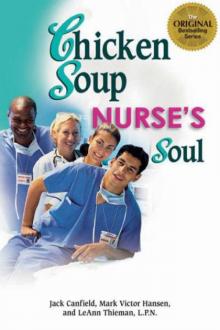 Chicken Soup for the Nurse's Soul: Second Dose
Chicken Soup for the Nurse's Soul: Second Dose Chicken Soup for the Ocean Lover's Soul
Chicken Soup for the Ocean Lover's Soul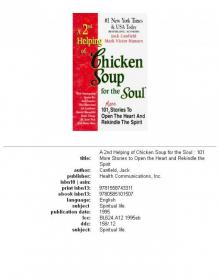 A 2nd Helping of Chicken Soup for the Soul
A 2nd Helping of Chicken Soup for the Soul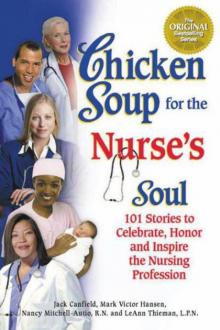 Chicken Soup for the Nurse's Soul
Chicken Soup for the Nurse's Soul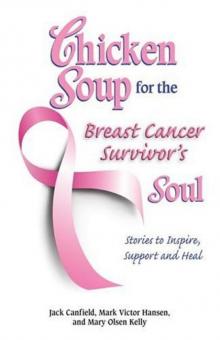 Chicken Soup for the Breast Cancer Survivor's Soul
Chicken Soup for the Breast Cancer Survivor's Soul Chicken Soup for the Pet Lover's Soul
Chicken Soup for the Pet Lover's Soul Chicken Soup for the Bride's Soul
Chicken Soup for the Bride's Soul A Chicken Soup for the Soul Christmas
A Chicken Soup for the Soul Christmas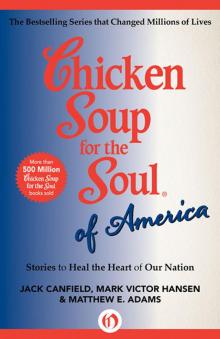 Chicken Soup for the Soul of America
Chicken Soup for the Soul of America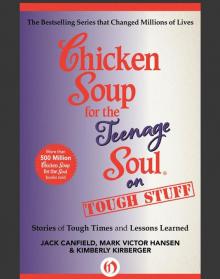 Chicken Soup for the Teenage Soul on Tough Stuff
Chicken Soup for the Teenage Soul on Tough Stuff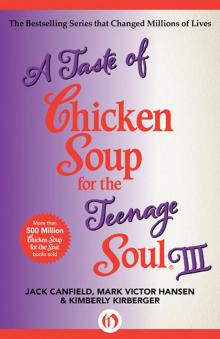 A Taste of Chicken Soup for the Teenage Soul III
A Taste of Chicken Soup for the Teenage Soul III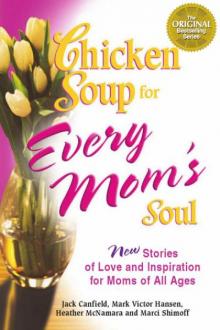 Chicken Soup for Every Mom's Soul
Chicken Soup for Every Mom's Soul Chicken Soup for the Dog Lover's Soul
Chicken Soup for the Dog Lover's Soul A Second Chicken Soup for the Woman's Soul
A Second Chicken Soup for the Woman's Soul Chicken Soup for the Soul the Book of Christmas Virtues
Chicken Soup for the Soul the Book of Christmas Virtues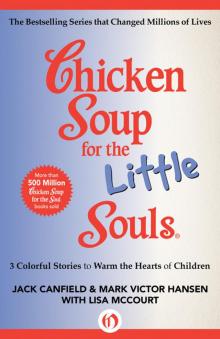 Chicken Soup for the Little Souls: 3 Colorful Stories to Warm the Hearts of Children
Chicken Soup for the Little Souls: 3 Colorful Stories to Warm the Hearts of Children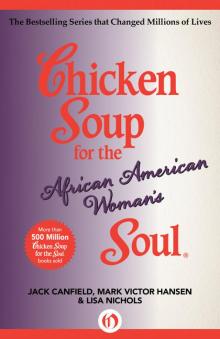 Chicken Soup for the African American Woman's Soul
Chicken Soup for the African American Woman's Soul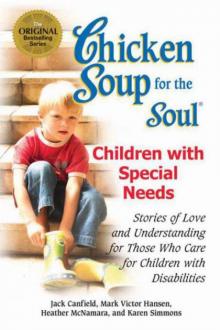 Chicken Soup for the Soul
Chicken Soup for the Soul Chicken Soup for the Soul Celebrates Teachers
Chicken Soup for the Soul Celebrates Teachers Chicken Soup for the College Soul
Chicken Soup for the College Soul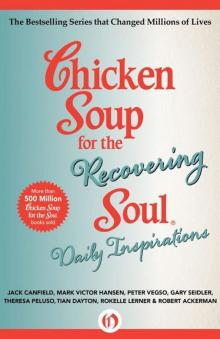 Chicken Soup for the Recovering Soul Daily Inspirations
Chicken Soup for the Recovering Soul Daily Inspirations Chicken Soup for the Soul Celebrates Sisters
Chicken Soup for the Soul Celebrates Sisters Chicken Soup for the Dieter's Soul
Chicken Soup for the Dieter's Soul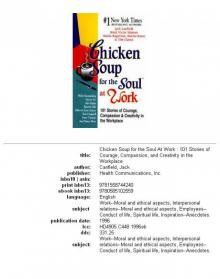 Chicken Soup for the Soul at Work 101 Stories of Courage
Chicken Soup for the Soul at Work 101 Stories of Courage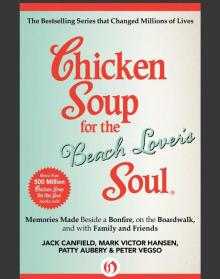 Chicken Soup for the Beach Lover's Soul
Chicken Soup for the Beach Lover's Soul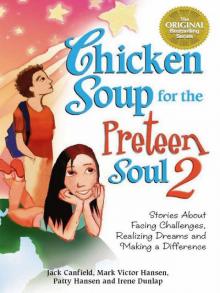 Stories About Facing Challenges, Realizing Dreams and Making a Difference
Stories About Facing Challenges, Realizing Dreams and Making a Difference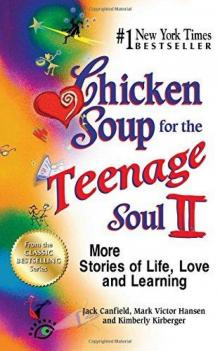 Chicken Soup for the Teenage Soul II
Chicken Soup for the Teenage Soul II Chicken Soup for the Girl's Soul
Chicken Soup for the Girl's Soul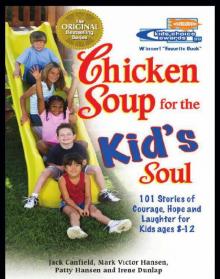 Chicken Soup for the Kid's Soul: 101 Stories of Courage, Hope and Laughter
Chicken Soup for the Kid's Soul: 101 Stories of Courage, Hope and Laughter Chicken Soup for the Woman's Soul
Chicken Soup for the Woman's Soul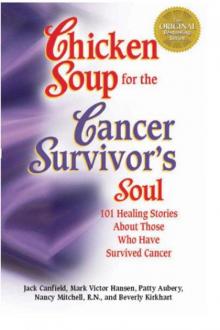 Chicken Soup for the Cancer Survivor's Soul
Chicken Soup for the Cancer Survivor's Soul Chicken Soup for the Canadian Soul
Chicken Soup for the Canadian Soul Chicken Soup for the Military Wife's Soul
Chicken Soup for the Military Wife's Soul A 4th Course of Chicken Soup for the Soul
A 4th Course of Chicken Soup for the Soul Chicken Soup Unsinkable Soul
Chicken Soup Unsinkable Soul Chicken Soup for the Soul: Christmas Magic
Chicken Soup for the Soul: Christmas Magic Chicken Soup for the Grandma's Soul
Chicken Soup for the Grandma's Soul Chicken Soup for the Soul: All Your Favorite Original Stories
Chicken Soup for the Soul: All Your Favorite Original Stories Chicken Soup for the Expectant Mother's Soul
Chicken Soup for the Expectant Mother's Soul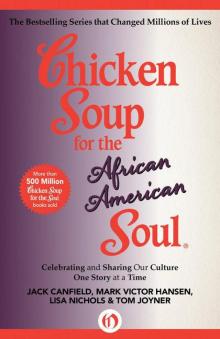 Chicken Soup for the African American Soul
Chicken Soup for the African American Soul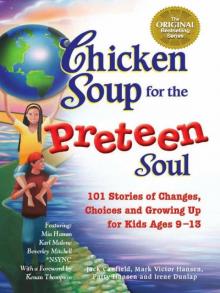 101 Stories of Changes, Choices and Growing Up for Kids Ages 9-13
101 Stories of Changes, Choices and Growing Up for Kids Ages 9-13 Christmas Magic
Christmas Magic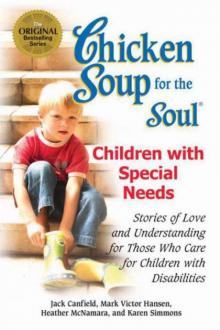 Chicken Soup for the Soul: Children with Special Needs
Chicken Soup for the Soul: Children with Special Needs Chicken Soup for the Soul: Country Music: The Inspirational Stories behind 101 of Your Favorite Country Songs
Chicken Soup for the Soul: Country Music: The Inspirational Stories behind 101 of Your Favorite Country Songs Chicken Soup for the Country Soul
Chicken Soup for the Country Soul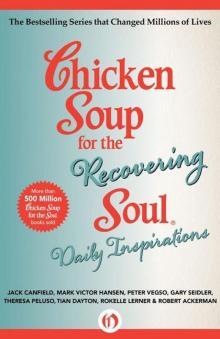 Chicken Soup for the Recovering Soul Daily Inspirations (Chicken Soup for the Soul)
Chicken Soup for the Recovering Soul Daily Inspirations (Chicken Soup for the Soul) A 3rd Serving of Chicken Soup for the Soul
A 3rd Serving of Chicken Soup for the Soul The Book of Christmas Virtues
The Book of Christmas Virtues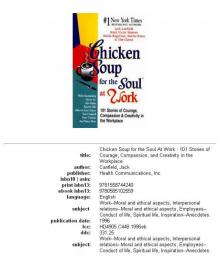 Chicken Soup for the Soul at Work
Chicken Soup for the Soul at Work Chicken Soup for the Soul 20th Anniversary Edition
Chicken Soup for the Soul 20th Anniversary Edition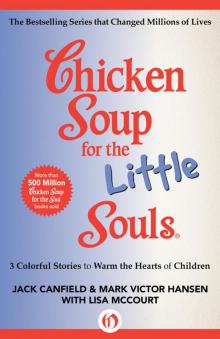 Chicken Soup for the Little Souls
Chicken Soup for the Little Souls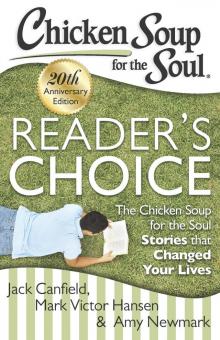 Chicken Soup for the Soul: Reader's Choice 20th Anniversary Edition
Chicken Soup for the Soul: Reader's Choice 20th Anniversary Edition Chicken Soup for the Soul Christmas
Chicken Soup for the Soul Christmas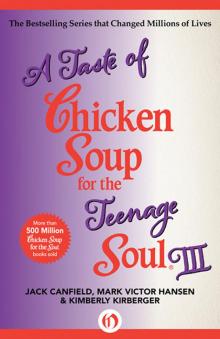 Taste of Chicken Soup for the Teenage Soul III
Taste of Chicken Soup for the Teenage Soul III Chicken Soup for the Unsinkable Soul
Chicken Soup for the Unsinkable Soul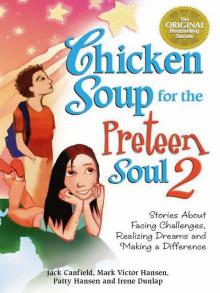 Chicken Soup for the Preteen Soul II
Chicken Soup for the Preteen Soul II